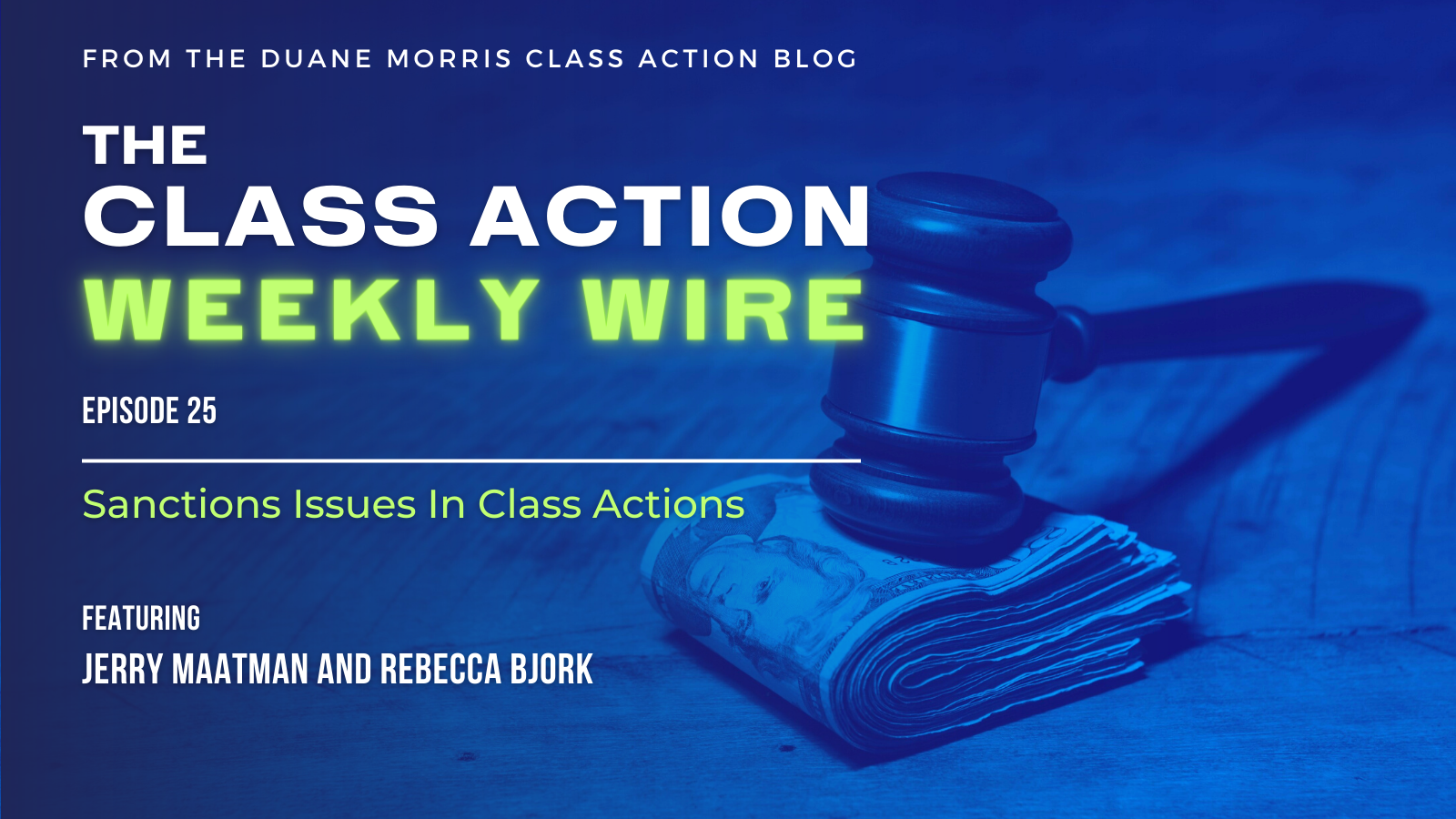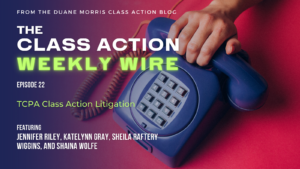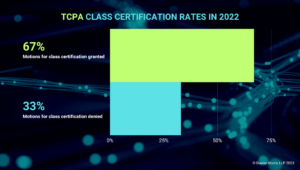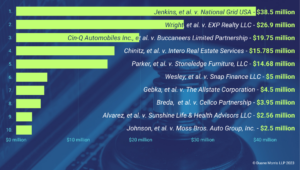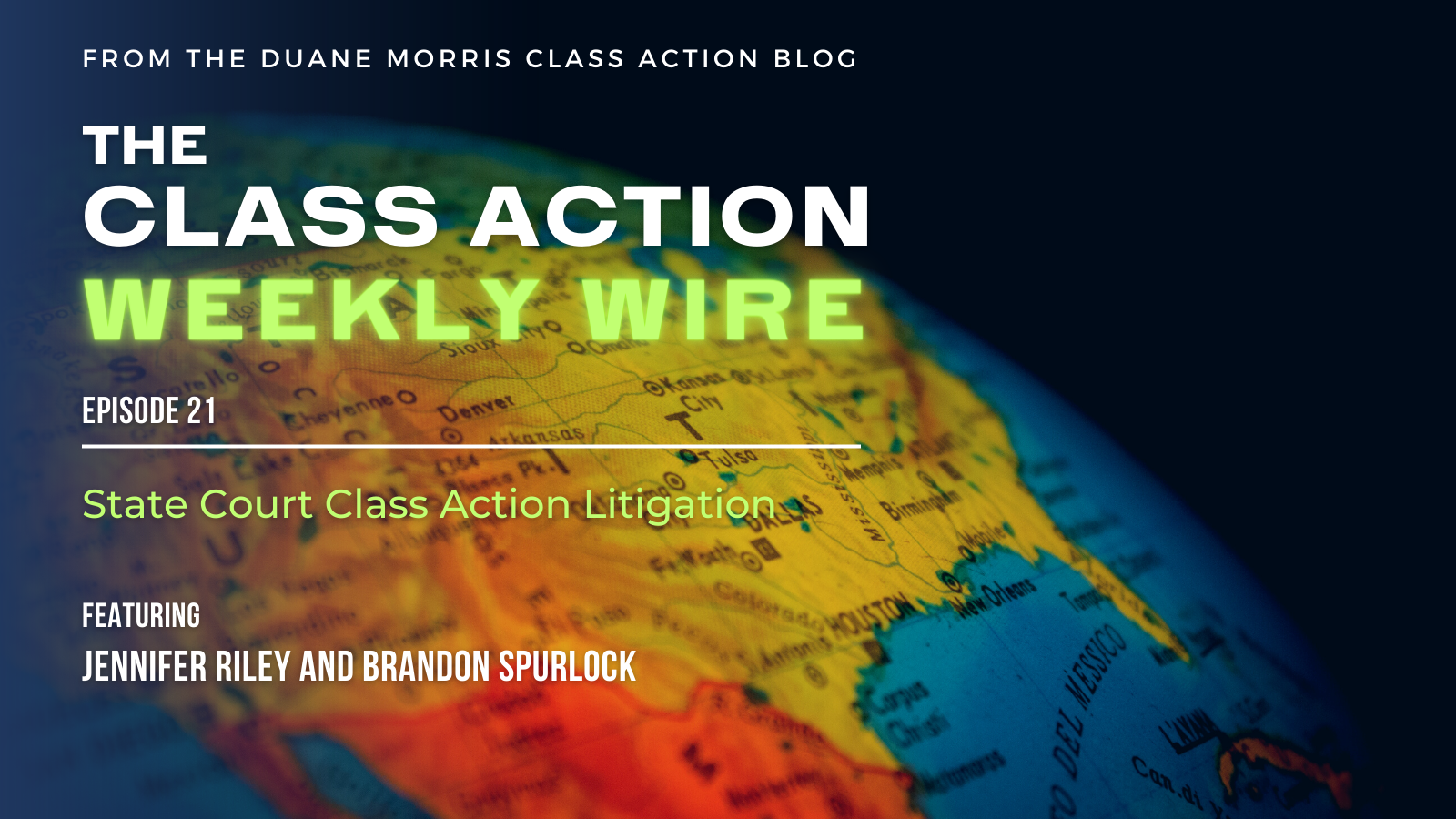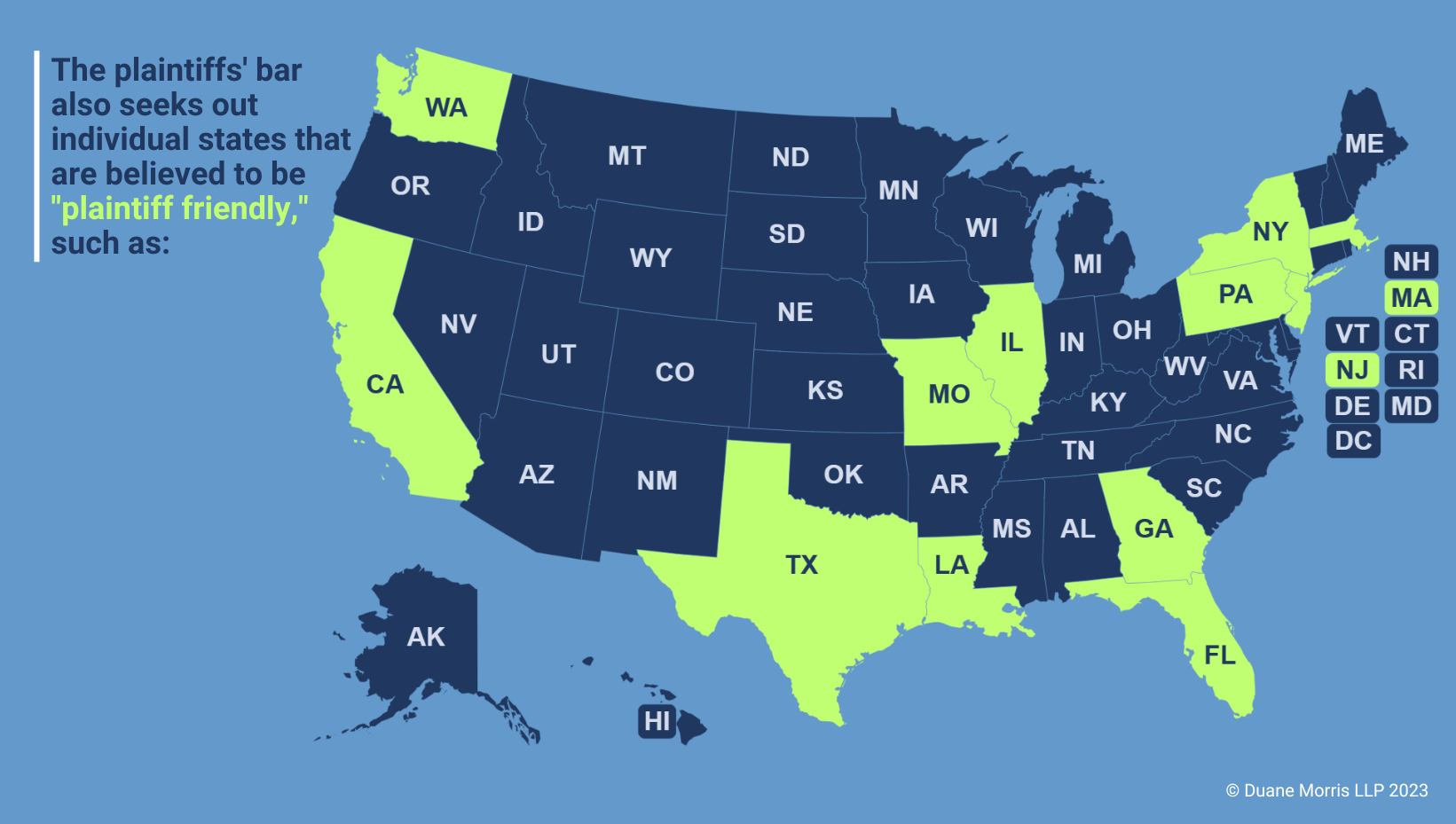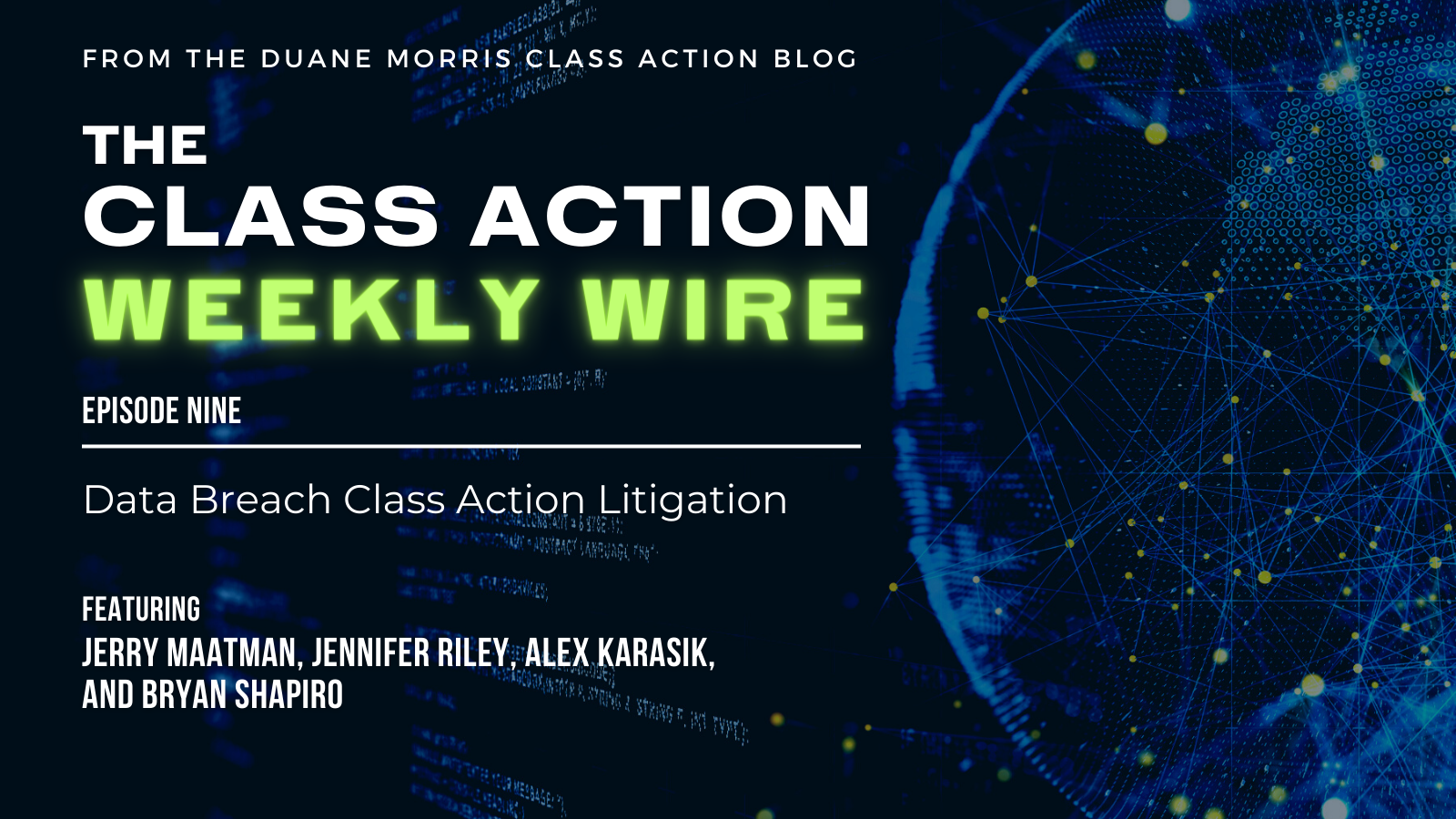 Duane Morris Takeaway: This week’s episode of the Class Action Weekly Wire features Duane Morris partner Jerry Maatman and associate Ethan Feldman with their analysis of key trends in product liability / mass tort class action litigation in 2022.
Duane Morris Takeaway: This week’s episode of the Class Action Weekly Wire features Duane Morris partner Jerry Maatman and associate Ethan Feldman with their analysis of key trends in product liability / mass tort class action litigation in 2022.
Episode Transcript
Jerry Maatman: Welcome loyal blog readers to our Friday series of podcasts, the Class Action Weekly Wire. I’m Jerry Maatman, partner at Duane Morris, and joining me today is my associate Ethan Feldman, and we’re here to talk about products liability and mass torts. Welcome, Ethan.
Ethan Feldman: Great to be here. Thank you for having me, Jerry.
Jerry: I’ve read somewhere in various accounts that 2022 was a phenomenal incredible year for the class action space when it came to products liability and mass torts. How would you sum up what happened in the last 12 months?
Ethan: It’s definitely been busy – it always is. Last year we saw a lot of settlements in the opioid arena, they totaled around $50 billion – that’s with the B billion – due to a bunch of multi-billion dollar settlements coming out of multi-district litigations. A lot of the lawsuits were brought by state and local governments against the manufacturers and distributors. One of the main players in there was Purdue Pharma, the manufacturer of OxyCotin. That entity agreed to pay $12 billion in settlements. A the end of May 2023, the Second Circuit approved a plan under the under which the Sackler family – the owners of Purdue Pharma – actually would give up ownership of the company and contribute $11.5 billion in cash over time to distribute to a fund to prevent and treat addiction. Of those funds $750 million is slated to go to individual victims and payouts are expected in the range of about $3,500 to $50,000. The retailers were also involved – CVS, Walgreens, and Walmart agreed to settle their claims for about $14 billion with the state and local governments. Oher manufacturers, Teva and Allergan, reached settlements not to exceed $4.25 billion and $2.37 billion, paid out over 13 years. Some other distributors involved McKesson, Cardinal Health, Amerisource Bergen, agreed to pay not more than $20 billion over 18 years. There were also 40 states that have their own specific agreements about apportionments between state and local counties that have opted into the settlement – they’re all very different, the general theme is that
it’s determined by population, that’s how the apportion is going to be governed.
Jerry: Absolutely eye-popping numbers. To my way of thinking, the only analog in the recent American jurisprudence would be two decades ago when attorneys general settled big tobacco product liability and mass tort case cases. So is there anything left or are we going to continue to see the tale of opioid litigation settlements in 2023?
Ethan: I think there’s going to be some more in 2023 there’s a website Opioidsettlementtracker.com which reports that there’s some settlement amounts between U.S. governments – not federal, the state and local like I talked about, so I think we’re going to start to see some of some of those come to fruition in 2023.
Jerry: Really quite a story and a headline for 2022 and 2023. For our listeners could you articulate in the class action space the difference between uh product liability as opposed to mass torts and how they’re different and how uh they’re they are related?
Ethan: So they’re definitely related but they’re also very different. Generally if you take the sphere of product liability, you can divide that up into two categories. There’s the injury claims and then there’s the labeling claims, you can also think of the labeling claims as false advertising. The injury claims are best suited for the mass tort actions and the labeling claims more so lead to class actions. The injury mass tort actions usually can’t satisfy the Rule 23 evidentiary requirements or the similar state procedural laws for that matter just due to the individualized nature of plaintiff-specific circumstances that require individual proof of the injury. For example, you get a mass tort action that you know plaintiffs claim they took a medication that causes all different kinds of cancers, those individual claims would require different types of proof that would likely prevent class certification. Those types of claims are often are defeated at the at the class certification stage, you know they do lend themselves however to multi-district litigation and other coordinated proceedings that you can find in the states that involve the same products, same descendants, and the same set of operative facts.
Jerry: That’s a great description of both the differences and the relatedness of them. When I teach my law class at Northwestern, the kind of the theme of a class action is the ability to put one person on the stand they tell their story and it transposes to everyone else, and when you’re dealing with mass torts and personal injury claims everybody’s damages tend to be different although those cases tend to be ripe for issue certification where liability issues might be dealt with on a class-wide basis but injuries in individual hearings. You mentioned MDLs, or multi-district litigation, could you explain for our listeners the role that MDLs have in this space?
Ethan: So, in 2022 the JPML – the Judicial Panel on Multi-District Litigation – reported there are 172 pending MDLs across the country. 21 of those had over 1,000 pending actions, and another 24 of them had 100 and 1,000 actions. The biggest was the 3M ear plug litigation, which had over 250,000 claimants. MDL proceedings make up roughly 50% of all the federal dockets. So the MDL actions can often, like we spoke about, contain the individualized product claims distinct from the class claims. For example, in addition to the class claims there’s current litigation over nicotine products which has a personal injury aspect of it, which include allegations that exposure to nicotine can alter brain development.
Jerry: You know, that the 3M ear plug litigation got a lot of play in the media last year. Could you explain for our listeners what’s going on in that MDL?
Ethan: That MDL called In Re 3M Combat Arms Earplug Products Liability Litigation is currently pending in the United States District Court in the Northern District of Florida. There’s been a bunch of bellwether trials there, the verdicts were all over the place. We saw a plaintiff verdict for $77 million and you also see defense verdicts. That docket has you know over 3,500 filings, it was initially formed in 2019, and has even seen recent transfers into the MDL today four years later. Right now those proceedings are stayed due to bankruptcy filed by a defendant that was acquired by 3M during the manufacturing of the earplugs that are at issue, plaintiffs of course want to lift the stay for certain claims that don’t involve that defendant. That master long-form complaint actually contains 16 different causes of action, violations of states consumer protection laws, but the main point of the complaint is that defendants knew the earplugs were defective, made statements that misrepresented their effectiveness, and relying on those misrepresentations – the plaintiffs use the earplugs and develop the hearing disorders because of that. There’s also accounts for negligence and strict liability under a design defect series as well.
Jerry: Well, thanks for that cogent description. What are other hot areas in the products liability and mass tour arena? I gave a presentation at a class action conference last month in New York, a two-day conference, and day two was all about what was called the Camp Lejeune mass tort litigation in terms of uh what’s going on in the Eastern District of North Carolina – would that be an area that our listeners should look to in 2023 for big developments in this space?
Ethan: Yeah, absolutely. I think you’re referencing to PFOA litigation – I’m going to do my best to pronounce it – perfluorooctanoic acid, it’s very well known as PFOA litigation. These are used in a wide variety of products, they’re often called forever chemicals because they take a long time to decompose. There’s types of lawsuits that defendants should have known that the PFOAs have the potential to cause bodily injury and there’s also been several lawsuits brought on behalf of states by the Attorneys General for water contamination and things like that. There’s always going to be pharmaceutical litigation and medical device litigation, but the hotbed right now seems to be the PFOA litigation.
Jerry: These are great insights and analysis, Ethan. Thank you very much for joining us on the Class Action Weekly Wire, and to our loyal blog listeners thank you for tuning in to our Friday podcast. Have a great day.

